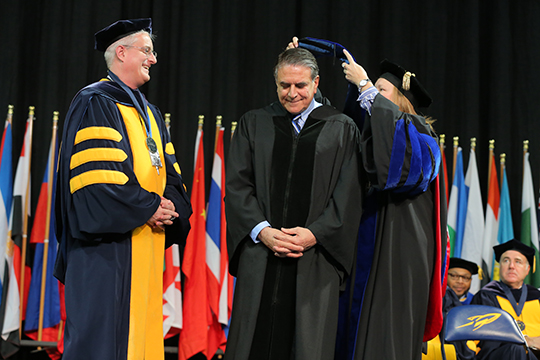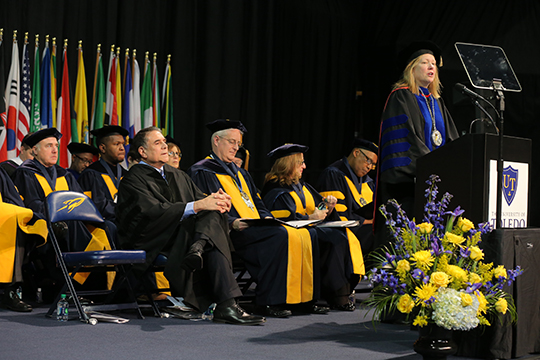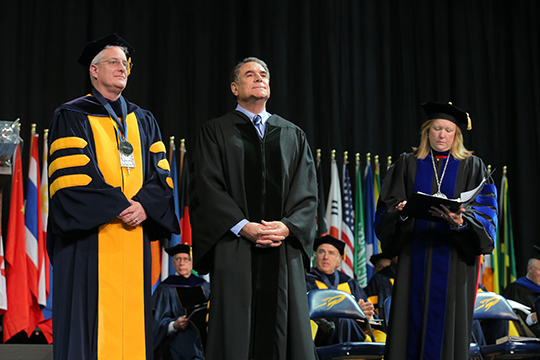Digging for the truth
Alumnus Michael Sallah rights wrongdoing through investigative journalism
By Laurie B. Davis
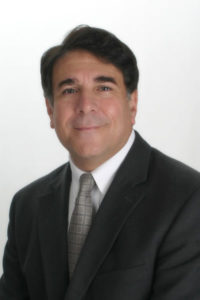 Michael D. Sallah, A/S ’77, had just begun taking courses in mass communications and the history of journalism at The University of Toledo not long after U.S. President Richard M. Nixon resigned from office. Journalists Bob Woodward and Carl Bernstein had uncovered Nixon’s role in Watergate, a scandal that hit America in its political gut. For their investigative exposé, the two journalists received a Pulitzer Prize.
Michael D. Sallah, A/S ’77, had just begun taking courses in mass communications and the history of journalism at The University of Toledo not long after U.S. President Richard M. Nixon resigned from office. Journalists Bob Woodward and Carl Bernstein had uncovered Nixon’s role in Watergate, a scandal that hit America in its political gut. For their investigative exposé, the two journalists received a Pulitzer Prize.
Sallah has since earned a Pulitzer Prize as a reporter and another Pulitzer as an editor. Twice, he has been a finalist for the top prize.
A native of Toledo, Sallah says he knew by the fall of his freshman year at UT that he wanted to be a journalist. “I fell in love with journalism almost from the start. This is after Watergate, and we were still very much captivated by the reporting of these two young reporters from The Washington Post who had toppled a presidency.”
Bernstein and Woodward left an impression on Sallah and many of his classmates, who learned how investigative journalism had the power to do good in the world. “It was very intriguing to me,” says Sallah, who would eventually combine his love for writing with his passion for social justice to uncover corruption, abuses of power and other scandals during his career. “I attended St. John’s, a very Jesuit school, and I was very much imbued with social justice. When you combine the two, you kind of gravitate toward that investigative genre of journalism. I knew even then I loved that field, but I knew it was specialized, and it would take some time before I could do it.”
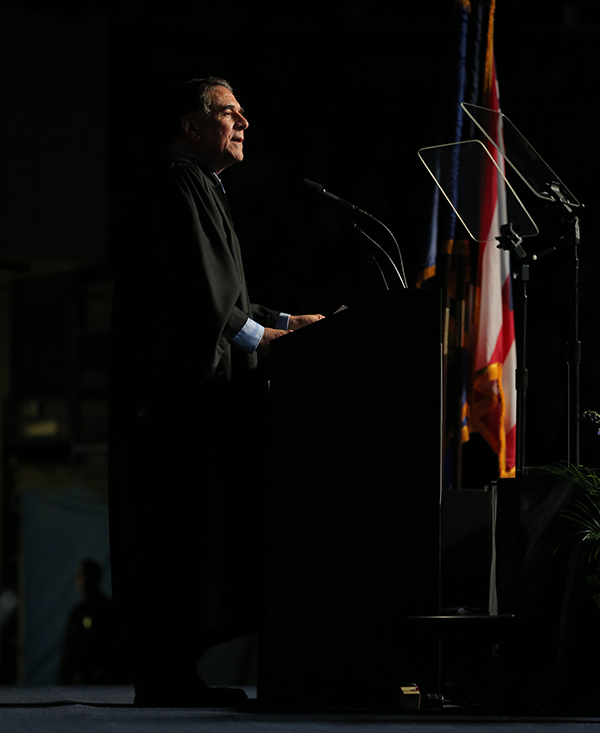 Sallah, who addressed 2,067 degree candidates at UT’s Dec. 17 commencement, did become an investigative journalist and went on to receive his first Pulitzer Prize as a reporter and national affairs writer for his hometown paper, The Blade. He and his co-authors, Mitch Weiss and Joe Mahr, dug into the U.S. Army’s cover-up of war crimes committed in Vietnam by members of the elite military unit Tiger Force. The series of stories received many national awards as well as the 2004 Pulitzer for Investigative Reporting.
Sallah, who addressed 2,067 degree candidates at UT’s Dec. 17 commencement, did become an investigative journalist and went on to receive his first Pulitzer Prize as a reporter and national affairs writer for his hometown paper, The Blade. He and his co-authors, Mitch Weiss and Joe Mahr, dug into the U.S. Army’s cover-up of war crimes committed in Vietnam by members of the elite military unit Tiger Force. The series of stories received many national awards as well as the 2004 Pulitzer for Investigative Reporting.
As an editor and reporter for the Miami Herald, Sallah led an investigative reporting team that produced “House of Lies,” a series of stories published in 2006 about waste, favoritism and a lack of oversight of Miami-Dade County public housing. The series resulted in investigations and prosecutions and earned the 2007 Pulitzer Prize in Local Reporting.
Sallah also has twice been a Pulitzer Prize finalist. He received this distinction in 2012 for his series “Neglected to Death,” which focused on severe abuses in Florida assisted-living facilities. He again was named a finalist in 2016 for “License to Launder: Cops, Cash and the Cartels,” his work on stories that exposed a corrupt police unit that laundered $71.5 million for drug cartels and failed to make a single arrest.
Currently, Sallah works as a national investigative reporter at Gannett/USA Today Network. He is the co-author of two books written with his fellow Pulitzer Prize recipient Mitch Weiss: “Tiger Force: A True Story of Men and War” and “The Yankee Comandante: The Untold Story of Courage, Passion, and One American’s Fight to Liberate Cuba.”
The hunt for evidence
There are two factors that drive Sallah to expose the dirt in these American institutions: the possibility of righting a wrong and the hunt for evidence that proves wrongdoing. “When we find these problems in society, there’s always a sense of righteous indignation, when you see something that’s wrong and you have to address it. I think that aspect of it is always good, and it’s kind of our calling,” says Sallah. What sustains his curiosity are the puzzles that must be put together by following leads and clues and mining the data. “There’s a certain intriguing process to that. It creates its own energy, so every project you approach, you face all of these challenges, whether it’s getting your arms around all of the data and being able to see whether the markers are all there and you can show what you’re attempting to show; is the evidence there? There’s a hunt aspect to it, and that’s what keeps you so alive. Every new project presents new problems to solve and new benefits to be gained by what you do,” he says. “That’s why I love it.”
Before making a major investment of time, Sallah must consider what many investigative journalists think about: Will this story resonate with readers, and what’s the potential for finding the necessary supporting evidence of any wrongdoing?
Sallah says once a problem is identified and rumors are multiplying, journalists can see the potential for a story. “But you have to prove it,” he adds. Sallah and his team spent a year looking into such a situation in a small, historically African-American community in Florida. “It was the citizens who brought it to our attention that public servants were shaking people down for bribes. If you wanted to get an occupational license, you had to pay city council members under the table.”
Once witnesses — including some who were FBI informants — were willing to testify, the story had legs. “So, they had the tapes, they had the video, and you can’t do much better than that. Then we were able to get a city manager who agreed to turn over a lot of the internal documents to us. Then you realize, bingo, we’ve got something. We’ve got city officials stealing from the public trust.”
Sallah discovered that officials were looting the treasury and running up major credit card bills for elaborate dinners and pet projects. “So, we had the goods. It’s one thing to know there’s a potential story about corruption here, but can you establish it?” Sallah often uses spreadsheets and works with experts in accounting, law and medicine to analyze information. “You can’t do a lot of these projects without very sophisticated computer-assisted reporting. It’s part and parcel to the work we do,” says Sallah.
“And, we go for the jugular, too, in journalism. When you have the goods, and you’ve done your due diligence, and you’ve ensured that this story stands up, you go for it all. You don’t make apologies, you don’t hesitate, you don’t clutch,” Sallah says. “I think that’s what readers want. They want to know what’s there.”
The risks and horrors of war
Occasionally, stories can create public pushback, notes Sallah. He and fellow journalists Weiss and Mahr spent eight months in 2003 investigating and writing their series on the Tiger Force military unit that operated during the Vietnam War. Members of that unit had violently lost control between May and November 1967, killing civilians in Song Ve Valley in Vietnam’s Central Highlands. The United States invaded Iraq in March 2003, based on intelligence that Saddam Hussain had “weapons of mass destruction” in his country’s arsenal — intelligence that later proved to be false. By the fall of 2003, Sallah and his colleagues completed their series on soldiers who committed war crimes 36 years earlier.
“Our publishers had to decide if we were going to run it because we were in the war in Iraq, it was post-9-11. There was a lot of patriotism.” The Blade reporters’ investigation pointed to 18 soldiers who killed Vietnamese women, children and elderly civilians. Any charges that might be brought against them ranged from murder, dereliction of duty and assault. “The Army buried it,” says Sallah, adding that The Blade team reasoned, “If we don’t do this story, then we’re guilty of the same cover-up. Our job as journalists, as painful as it is, is to tell the truth.”
Sallah says initially there was a lot of pushback, but as the series continued, the stories pointed to how combat affects soldiers. “People began to see it wasn’t a story just about exposing the Army, but it was about what happens in a war — when war unfolds in a civilian setting and the atrocities that can take place. In the end, people were much more appreciative of the story,” he says.
The Associated Press picked up the story, and it appeared in numerous large newspapers, including The Washington Post and the Miami Herald, and was detailed in The New Yorker magazine. More media outlets covered the story, including ABC’s “Nightline,” “PBS NewsHour” and National Public Radio’s “All Things Considered.”
The experience of writing about the horrors of war made Sallah think about the serious decision of initiating a war. And he thought about Iraq. “You have to weigh what kind of civilian risk there will be when going into a war. I was more conscious of the fact that civilians are going to die in this war. I was leery of that.” He also thought about the toll this new war would take on soldiers and how many would suffer post-traumatic stress disorder. “These confrontations, not just with the enemy, but also with civilians, are going to dominate the rest of their lives. We have to be very judicious,” he says, when the country goes to war.
Setting the record straight
As a prominent, award-winning journalist, who, as an individual and a team leader, has competed on the national level for many of journalism’s top awards, Sallah values the work of investigative reporting. “While the Pulitzers can change the trajectory of your career, you have to be ever-mindful that it’s the work that you love, that you gravitate toward. I wouldn’t trade the work for all the awards in the world. The work is far more important to me,” says Sallah.
He recalls the assisted-living story that uncovered resident abuse and neglect. “You saw how these people were living. And you could change their lives.” In fact, this series ended the abuse and some facilities were torn down. A victory for journalism, but also for the seniors who deserved to live the remainder of their lives with proper care and dignity.
As communications technology continues to shake up the journalism profession and newspapers strive to adapt to them, the business of journalism also is being threatened by accusations of false reporting or producing “fake news.” “The assault on good journalism today is done by people who have the most to hide,” says Sallah. “And they’re using that and twisting and perverting it. And it’s sad,” he says, defending his profession.
With these challenges, Sallah says he would advise any student considering journalism as a career to “be a journalist because of that. Go into journalism to set the record straight. Go into journalism to search for the truth. I would tell any journalist today to ‘wear your job as a badge of honor.’ We consider our work to be noble. It can save lives, it can save tax payers money, it can right wrongs, and it can shed light on the truth. If we don’t do this work, nobody is going to do it. We can leave it up to prosecutors and the police, and auditors and inspector generals. But they can’t do it all. It’s the media that fills the gaps,” he says.
In today’s political landscape — with a sitting U.S. president under investigation for alleged ties to Russia and “fake news” accusations being launched at the media — journalists must be even more diligent in their reporting and their search for truth. According to Sallah, the work of reporters has never been more imperative. “This president has done more for my profession than any single president since Richard Nixon,” he says. “He’s given new rise to investigative reporting. People want the truth. No matter what, that’s not going to change.”


